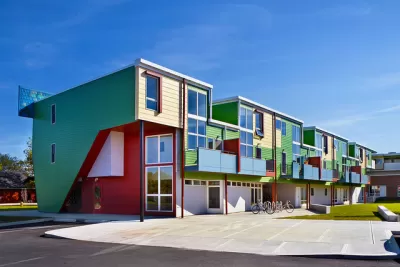The largest survey of inclusionary housing to date contrasts the efficacy of policies across the United States.

A new paper from the Lincoln Institute of Land Policy analyzes 886 local inclusionary housing policies across 25 states. The comprehensive study sheds light on how different jurisdictions have structured development requirements, as well as how effective they are in creating affordable supply.
The authors identified the jurisdictions that have adopted inclusionary housing programs, then categorized them by "whether they are mandatory or voluntary, whether they create for-sale or rental units, and crucially, the length of time for which they require units to remain affordable," Lincoln's blog explains.
Around 200,000 affordable housing units and $2 billion in-lieu fees can be attributed to inclusionary housing programs nationwide, according to the paper. Nearly all programs require units to remain affordable for 30 years or more—significantly longer than is typically mandated by federal programs.
FULL STORY: New study looks at hundreds of affordable housing programs across the United States

Study: Maui’s Plan to Convert Vacation Rentals to Long-Term Housing Could Cause Nearly $1 Billion Economic Loss
The plan would reduce visitor accommodation by 25,% resulting in 1,900 jobs lost.

North Texas Transit Leaders Tout Benefits of TOD for Growing Region
At a summit focused on transit-oriented development, policymakers discussed how North Texas’ expanded light rail system can serve as a tool for economic growth.

Why Should We Subsidize Public Transportation?
Many public transit agencies face financial stress due to rising costs, declining fare revenue, and declining subsidies. Transit advocates must provide a strong business case for increasing public transit funding.

How to Make US Trains Faster
Changes to boarding platforms and a switch to electric trains could improve U.S. passenger rail service without the added cost of high-speed rail.

Columbia’s Revitalized ‘Loop’ Is a Hub for Local Entrepreneurs
A focus on small businesses is helping a commercial corridor in Columbia, Missouri thrive.

Invasive Insect Threatens Minnesota’s Ash Forests
The Emerald Ash Borer is a rapidly spreading invasive pest threatening Minnesota’s ash trees, and homeowners are encouraged to plant diverse replacement species, avoid moving ash firewood, and monitor for signs of infestation.
Urban Design for Planners 1: Software Tools
This six-course series explores essential urban design concepts using open source software and equips planners with the tools they need to participate fully in the urban design process.
Planning for Universal Design
Learn the tools for implementing Universal Design in planning regulations.
Ascent Environmental
Borough of Carlisle
Institute for Housing and Urban Development Studies (IHS)
City of Grandview
Harvard GSD Executive Education
Toledo-Lucas County Plan Commissions
Salt Lake City
NYU Wagner Graduate School of Public Service





























